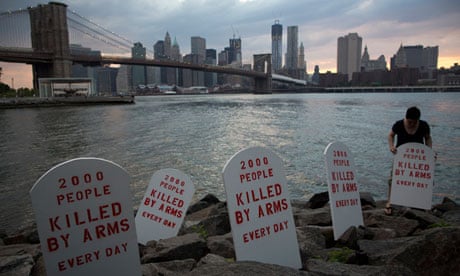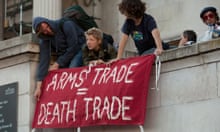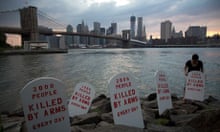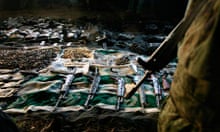Britain is "betraying the original spirit" of an international treaty that is designed to regulate the $1tn global arms trade, according to the former foreign secretary David Miliband.
In a strongly worded Guardian article, Miliband says that the treaty could collapse in talks at the UN this week in part because the British government "stood aside" in the negotiations. "As the negotiation of the treaty is reaching a crunch, my fear is that the government is betraying the original spirit that animated it," the former foreign secretary writes.
More than 150 countries have sent delegations to the UN conference to agree a new arms trade treaty, first raised by Nobel peace prize winners, which is designed to transform the arms industry. A draft of the treaty said that governments must not sell arms to countries where there is a "substantial risk of a serious violation" of human rights. Russia would have been prevented from supplying arms to Syria if the treaty had been put in place.
Miliband, who led a campaign as foreign secretary to regulate the arms trade, writes: "The arms trade treaty would tackle the unregulated flow of conventional weapons. It would address, for example, the under-reported but nonetheless deadly fact that up to 1,000 people a day – mostly women and children – are killed by such arms, often in the world's poorest countries. These weapons are used against UN peacekeepers from all round the world, as well as in inter-communal violence."
Miliband points out that the "intransigence" of Syria and Iran could lead to the collapse of the treaty. But he has criticised Britain for failing to join 74 countries whose delegates took to the floor of the UN last Friday to plead for the treaty to be saved.
"The UK stood aside," Miliband writes. "The private rationale was about 'building consensus'. That can be noble, but not if it involves abandoning principle. The danger is that in keeping quiet to seek an agreement, we end up with a deal so weak that it is not worth the paper it is written on."
In the article, he also warns of high stakes as Russia sells arms to Syria and issues an appeal for Britain to act. "If the government really cares about this treaty then it needs to get off its backside. It is going to go down unless a country like Britain stands up and makes a fuss. It is no good saying you favour a strong treaty but backsliding when the going gets tough. They risk throwing away political clout by their inability to build alliances, and forfeiting moral authority by their unwillingness to hold to positions of principle. Maybe they think no one will notice. It is time to say loud and clear that we will. "






